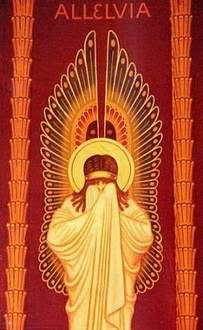For my degree (MA, Theology), the comprehensive exams entailed the following:
Topics
Write four topics in your major (mine was liturgy) and two topics in your minor (mine was systematics). (For the Liturgical Studies degree, you write five topics on liturgy.) Sumbit these by email to the academic advisor who gives them to your comps board (made up of three faculty members in your areas of study; you don't get to choose your board). I had to submit these by noon on the Wednesday before I was scheduled to write my exam papers (more on this below). All communication with your board from this point is done through the academic advisor who is not a member of the board. This topics step is critical; people have failed even here.
Papers
If your board accepts your topics, then on the following Monday morning, they send you three questions based on your topics (two in your major, one in your minor). From Monday when you get your questions to noon on Friday, you write three five-page essays--12-point font, regular margins, no footnotes, cite within the text, include a “works cited” page--addressing the questions from your board. You are free to write whenever and wherever you like and to consult notes, books, the library, friends, the Internet, tea leaves, whatever you need to finish these papers by Friday. This is harder than it seems.
By noon on Friday, you submit an electronic copy and three hardcopy sets of your papers to your board. Then you wait, drink heavily, and resist the urge to get on a plane and go home. The academic advisor contacts you over the weekend to let you know if you've passed the written portion of your exams. If you have, then you are scheduled for the oral portion of the exam the following week.
Orals
The oral exam is a one-hour conversation with your comps board. Mine took place around the table in the Dean's office, just me and the three professors. The first fifteen to twenty minutes consists of questions from each board member on your exam papers. In my exam, there were several questions like, "You said this on page x of this paper; tell me more about that;" or, "You cited Augustine's Confessions in this paper; what did he say about x?" You should bring your own clean copy of your papers so you can follow the board's references.
Then the rest of the exam is mostly on topics from your reading list and any other topics that flow from the conversation. Now I had heard that questions on the reading lists aren't usually specific. But I learned, don't believe everything you hear. The first question I received in this portion of the exam was something like, "In Vorgrimler's Sacramental Theology, do you recall this name: _______, and what did he say about the fundamental sacrament?" I kid you not! I didn't recall the name (it was very obscure, and I can't recall it now), but I could figure out the response from the context of the conversation. I had several more questions like that: "In this book, in the chapter on such and such, what did the author say about this topic?" So read your reading list! And at least scan the books you've read a while ago.
After what I thought was the longest hour in history, the conversation became more personal and pastoral. The questions addressed some current issues in the Church, for example, charismatic language in liturgies with youth, and how I would respond to someone who took a certain stance on the issue. The last question (of the longest hour in the world!) was, "what is one thing that I have experienced at Saint John's that will influence my theological and ministerial work?"
Then it's time to leave the room and wait in the lobby while the board deliberates. After a few minutes, one of the board invites you back into the room, and if you're lucky, all the board stand and congratulate you and shake your hand. While you're recovering from the shock, everyone sits down again, and each board member says a few things about what impressed them about your exam and other very gracious words. Then you thank them profusely and try not to look so dazed. After you leave the exam room, you fill out some information forms for your diploma. Then you celebrate like crazy!

No comments:
Post a Comment